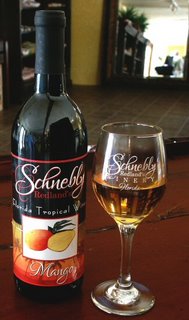
Some years ago, I was tromping through the fields at the Eden Vineyards and Winery in Alva, a little burg east of Fort Myers, Fla., and about an hour’s drive south of Tampa.
I was there to look over the modest operation for several reasons. It was the state’s oldest winery, the southernmost winery and vineyard in the continental United States, and it purported to be the only commercial winery using carambola, more popularly known as star fruit.
Fast forward to today. Eden now holds only one of those distinctions. It still is Florida’s oldest operating winery.
The emergence of Schnebly Redland's Winery has taken away the geographic title. It’s located in Homestead, down near Miami. And it, along with Eden and several other producers, makes carambola wine.
Schnebly Redland, owned by the husband-wife partners Peter and Denise Schnebly, is part of a growing niche in the American winemaking industry using more than grapes, or avoiding them altogether.
The Schneblys, for example, produce five grape-free varieties of tropical fruit wines: carambola, mango, lychee, guava and passion fruit. They range in price from $13.95 to $18.95. The winery ships orders to all states except Massachusetts, New Jersey, New Hampshire and Utah.
For a long time, non-grape wines were primarily the province of the home winemaker. For one thing, it is easier to get good berries and fruits than it is to get wine-quality grapes. For another, aging rarely is necessary to ensure a good non-grape wine.
In judging various wine competitions around the country, I’ve noticed an uptick in recent years in non-grape wines its producers feel are of medal quality. Most have been in the port (blueberry, blackberry) and ice wine (peach, cherry) categories, but the range is broadening.
Sometimes the decision to go into non-grape wines has been the result of an established winery looking for new products to sell. In other instances, it has been a matter of economic survival.
A good example of that is Goold Orchards in rural upstate Rensselaer County, N.Y. The Goold family began selling apples there nearly a century ago, and Sue Goold Miller and her husband, Ed Miller, have used almost every trick in the book to keep their business healthy – selling cider, pies, pumpkins, holding breakfasts, craft shows, school tours, even sponsoring a 5-kilometer run on their grounds.
Now, they’re established the Brookview Station label for a semi-dry apple wine. They're giving it to friends and family while they await action on their bid to get state permission to become a farm winery.
Others fruit farms in New York have done the same thing. Warwick Valley Winery in Orange County, 70 miles from midtown Manhattan, makes hard cider and apple port. The Winery at Marjim Manor in Niagara County in the western part of the state has a variety of fruit wines such as apples, pears, cranberries and plums.
Grapes are delicate creatures, thus the use of other fruits in winemaking adds to the business potential for business people in more rugged climes.
North Rivery Winery in Jacksonville, Vt., for example, has carved out a solid place in the non-grape world.
There, rhubarb, raspberry, apple, and pear wines are made. Proprietors Curt and Wendy Barr have done so well since opening in 1985 that they expanded to a second facility, opening the Ottauquechee Valley Winery in nearby Quechee.
At the Three Lakes Winery in the Wisconsin north woods, several generations of the McCain family have parlayed what once was a hobby when they lived in Palo Alto, Calif., into a serious commercial wine business.
It was in California that John and Maureen McCain began using fruit from several of the Japanese plum trees in their front yard, and that led to using other fruits and berries, which in turn led to establishing their winery in an area where John had long vacationed.
Not every fruit winery is located out in the country, of course.
Ferrin's Fruit Winery, in Carmel, Ind., is a scant 20 minutes from downtown Indianapolis. There, David and MaryAnn Ferrin do offer three wines they make, but the bulk of what they produce comes from pears, apples, cherries, cranberries, plums, raspberries and blueberries.
Given that there is at least one winery in every state, it's a safe bet to predict bothing but growth in the non-grape wine industry as more and more people try to make a financial go of it.
To Dowd's Spirits Notebook latest entry.
To Dowd's Wine Notebook latest entry.
To Dowd's Brews Notebook latest entry.
Back to Dowd's Bar Blog
No comments:
Post a Comment